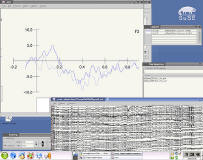Enterprise Resource Planning Software
Definition: An integrated suite of software applications typically handling the manufacturing, logistics, distribution, inventory, shipping, and invoicing in larger businesses.
ERP is "back office" software which focuses on the key business functions of manufacturing, supply chain management,
CRM, financial management and
Project Management. A well implemented ERP solution will improve the efficiency of the enterprise, reduce money tied up in stock/work in progress, and run a Just in Time inventory system.
By its nature the software needs to integrate with various other tools an enterprise uses, from
Customer Relationship Management software to the
HRM software, to marketing and accounting programs. In particular it tends to be closely tied into
stock control systems and
supply chain management/logistics systems.
 The process usually starts with a consultant studying the company's business processes and making recommendations as to relevant features/integration required in the ERP application. The business then either has the ERP software written from scratch or - to save reinventing the wheel - uses large modules of standard ERP software with many custom modifications. Some of the advantages to a good implementation of ERP software include lower stock costs (from ordering more appropriately, carrying less stock and JIT production), lower other costs (transportation, production etc), and savings from using less land, plant, machinery and staff to maintain the same level of operation. The process usually starts with a consultant studying the company's business processes and making recommendations as to relevant features/integration required in the ERP application. The business then either has the ERP software written from scratch or - to save reinventing the wheel - uses large modules of standard ERP software with many custom modifications. Some of the advantages to a good implementation of ERP software include lower stock costs (from ordering more appropriately, carrying less stock and JIT production), lower other costs (transportation, production etc), and savings from using less land, plant, machinery and staff to maintain the same level of operation.
IS ERP software suitable for a small business? As ERP is generally expensive to buy/install/implement a cost-benefit analysis may be a worthwhile exercise. The cost can be kept low by using "freeware" - like open source - examples: like ERP5 and Value.
Some of the major players in the ERP market are Oracle (and Peoplesoft), SAP,
Sage, and Microsoft.
|
 The process usually starts with a consultant studying the company's business processes and making recommendations as to relevant features/integration required in the ERP application. The business then either has the ERP software written from scratch or - to save reinventing the wheel - uses large modules of standard ERP software with many custom modifications. Some of the advantages to a good implementation of ERP software include lower stock costs (from ordering more appropriately, carrying less stock and JIT production), lower other costs (transportation, production etc), and savings from using less land, plant, machinery and staff to maintain the same level of operation.
The process usually starts with a consultant studying the company's business processes and making recommendations as to relevant features/integration required in the ERP application. The business then either has the ERP software written from scratch or - to save reinventing the wheel - uses large modules of standard ERP software with many custom modifications. Some of the advantages to a good implementation of ERP software include lower stock costs (from ordering more appropriately, carrying less stock and JIT production), lower other costs (transportation, production etc), and savings from using less land, plant, machinery and staff to maintain the same level of operation.